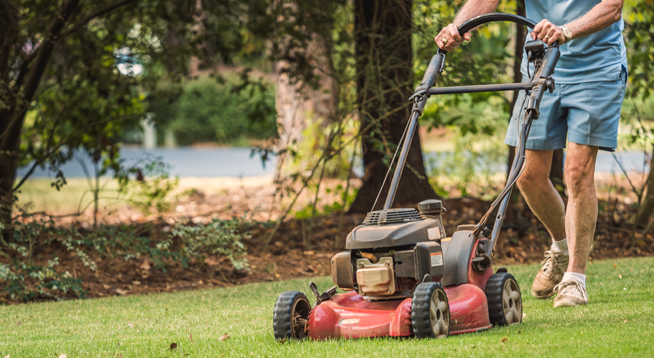
By Ken Calverley and Chuck Breidenstein
DETROIT, July 14, 2022 ~ What creepy, slimy creature eats decomposing grass, helps aerate our lawns and is generally killed en masse by our use of chemical fertilizers and herbicides?
If you responded with “earthworms” you take home the prize. The National Wildlife Federation says use of lawn chemicals can kill up to 90% of the earthworms in the soil.
A lawn of green grass is nearly a mandate around homes in the United States. In larger metropolitan areas, grass helps to cool things down in the summer and is a natural filter for the air around us.
It provides a soft and safe surface for kids to run and play on.
But, like many things in life, we complicate the issue regarding care and maintenance of our lawns. Landscape irrigation in the US is said to account for one-third of our total residential water use of nine billion gallons per day. It is further speculated that up to half of that is wasted as it evaporates or runs down our storm sewers rather than sinking into the soil as intended.
Homeowners install in-ground irrigation as a natural consequence of having a lawn, then run them every day whether the sun is shining, or it is pouring rain.
The reality is that an established lawn can flourish with a single, well timed, watering every week of ½ to 1 inch of water. Yes, that Bent grass at the local golf course does require wetting every day, but your Kentucky Blue grass and mixture of Fescues does not.
Your lawn will typically require about six-tenths of a gallon per square foot per week to supply that inch while the “golf grass” needs three times that.
You can measure your sprinkler’s output very easily using empty cans from soup, tuna or coffee by placing several around a sprinkled area and measuring the depth of water in them after an hour of running the system.
If you water early in the morning, the water will soak into the soils three to six inches and you can save money. The average cost of 1,000 gallons of water in the US is around $1.50. So, if you provide that once-a-week soaking to the average quarter-acre lot, it’ll cost you about $40 a month vs. the nearly five times that amount for over-watering.
Grasses, like most plants, do better when they are properly watered and forced to send their roots down deeper to seek it. Too much wetting can actually harm the grass and contribute to the growth of molds in the lawn.
Additionally, healthy, deep-rooted, grass is a natural deterrent to weed growth.
For many nuisance weeds, the best control is through the use of pre-emergents and applications in late fall before winter. Iowa State University found that the application of corn gluten meal in the spring worked well as a pre-emergent while also feeding the soil.
To obtain that thick, healthy, lawn, make certain you have the right pH in the soil. Take a soil sample into the local Michigan State Agricultural Extension Service and have it analyzed. Soil pH can be raised through application of lime and can be lowered through the use of sulfur — both carefully applied in the right concentration over time.
Frequent cutting of the grass with sharp blades that take no more than one-third of the grass length are suggested. Leaving the grass a bit longer at 3 inches is specified to help keep moisture in the ground.
There are also products such as Hydretain that you can apply to the lawn to help retain moisture in the soils.
Leaving those short clippings in the lawn can help to feed the earthworms and help retain moisture, but an annual de-thatching may also be required. You can use a simple thatch rake for smaller areas or rent a power lawn scarifier to remove all of that accumulated mat.
While those earthworms are also a natural aerator, it may be necessary to mechanically aerate once a year, especially in hard clay soils. This allows more moisture deeper in the ground while also helping grass roots to spread.
Having a thick, healthy, lawn doesn’t have to be the deep mystery so many assign to it, nor does it have to cost you a lot to maintain.
Like all of the professionals at InsideOutsideGuys.com know, the secret to walking on water is knowing where the stones are.
For housing advice and more, listen to the Inside Outside Guys every Saturday and Sunday on 760 WJR from 10 a.m. to noon or contact us at InsideOutsideGuys.com.
WJR TOP STORIES:

